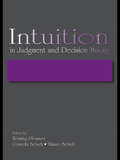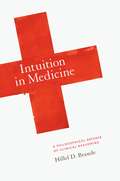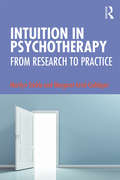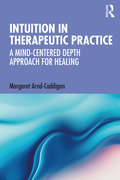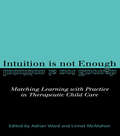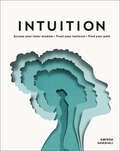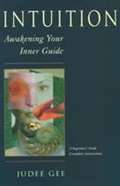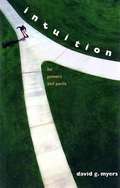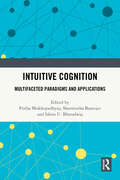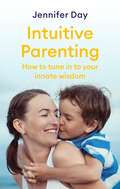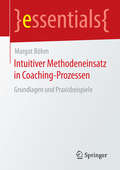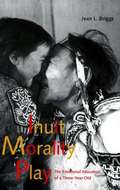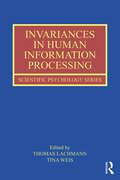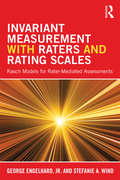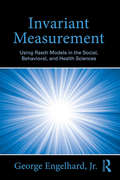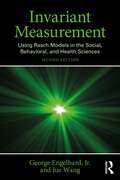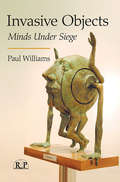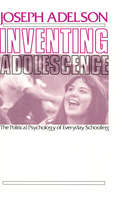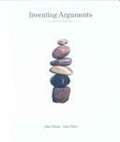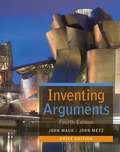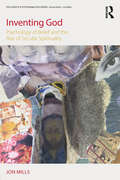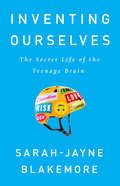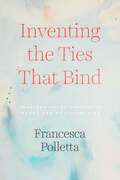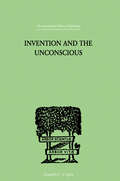- Table View
- List View
Intuition in Judgment and Decision Making
by Henning PlessnerThe central goal of this volume is to bring the learning perspective into the discussion of intuition in judgment and decision making. The book gathers recent work on intuitive decision making that goes beyond the current dominant heuristic processing perspective. However, that does not mean that the book will strictly oppose this perspective. The unique perspective of this book will help to tie together these different conceptualizations of intuition and develop an integrative approach to the psychological understanding of intuition in judgment and decision making. Accordingly, some of the chapters reflect prior research from the heuristic processing perspective in the new light of the learning perspective. This book provides a representative overview of what we currently know about intuition in judgment and decision making. The authors provide latest theoretical developments, integrative frameworks and state-of-the-art reviews of research in the laboratory and in the field. Moreover, some chapters deal with applied topics. Intuition in Judgment and Decision Making aims not only at the interest of students and researchers of psychology, but also at scholars from neighboring social and behavioral sciences such as economy, sociology, political sciences, and neurosciences.
Intuition in Medicine: A Philosophical Defense of Clinical Reasoning
by Braude Hillel D.Intuition is central to discussions about the nature of scientific and philosophical reasoning and what it means to be human. In this bold and timely book, Hillel D. Braude marshals his dual training as a physician and philosopher to examine the place of intuition in medicine. Rather than defining and using a single concept of intuitionOCophilosophical, practical, or neuroscientificOCoBraude here examines intuition as it occurs at different levels and in different contexts of clinical reasoning. He argues that not only does intuition provide the bridge between medical reasoning and moral reasoning, but that it also links the epistemological, ontological, and ethical foundations of clinical decision making. In presenting his case, Braude takes readers on a journey through AristotleOCOs "Ethics"OCohighlighting the significance of practical reasoning in relation to theoretical reasoning and the potential bridge between themOCothen through current debates between regulators and clinicians on evidence-based medicine, and finally applies the philosophical perspectives of Reichenbach, Popper, and Peirce to analyze the intuitive support for clinical equipoise, a key concept in research ethics. Through his phenomenological study of intuition Braude aims to demonstrate that ethical responsibility for the other lies at the heart of clinical judgment. aBraudeOCOs original approach advances medical ethics by using philosophical rigor and history to analyze the tacit underpinnings of clinical reasoning and to introduce clear conceptual distinctions that simultaneously affirm and exacerbate the tension between ethical theory and practice. His study will be welcomed not only by philosophers but also by clinicians eager to justify how they use moral intuitions, and anyone interested in medical decision making. a
Intuition in Psychotherapy: From Research to Practice
by Marilyn Stickle Margaret Arnd-CaddiganIntuition in Psychotherapy provides an unprecedented look at the phenomenon of clinical intuition, outlining its role in psychotherapy and providing a framework to develop intuitive skills that will positively impact practice. Based on qualitative research and extensive first-hand interviews, the text illuminates how an awareness of intuitive processes can benefit therapists’ diagnostic and treatment outcomes. Chapters provide a context for the use of intuition within current thinking in psychotherapy and highlight different forms of intuition that can be purposefully incorporated into clinical practice. Suitable for trainee and practicing psychotherapists, the text explores common intuitive processes and offers guidance for how practitioners might develop a unique therapeutic style. As understanding of intuition becomes mainstream in psychotherapy practice, Intuition in Psychotherapy will serve as a key point of reference for years to come.
Intuition in Therapeutic Practice: A Mind-Centered Depth Approach for Healing
by Margaret Arnd-CaddiganMargaret Arnd-Caddigan helps clinicians to expand their understanding of intuition by introducing mind-centered dynamic therapy (MCDT), providing them with the tools to incorporate this approach into their practice. Written accessibly for clinicians new to MCDT, the book presents this powerful method to help clients alter their thinking and overcome suffering. Divided into two parts, the book begins by clearly exploring the origins of intuition in philosophical thought, covering ideas such as panpsychism, cosmopsychism, and depth psychology views of mind, before examining how problems arise in psychotherapy from a Relational Perspective and how MCDT can help. Chapters then demonstrate how MCDT can be used in practice by exploring specific issues and treatment implications, clearly explaining how clinicians can define and develop general intuition, what the difference between clinical intuition and intuitive inquiry, and how clinicians can help clients develop their own intuition during sessions. Filled with practical examples, key points, and creative activities such as journaling and body work throughout, this book helps both clinicians and clients attune to and trust their own intuition in the process of healing. Rooted in empirical research and clinical practice, this book is essential reading for counselors, psychotherapists, and clinical social workers looking to incorporate intuition in their therapeutic approach.
Intuition is not Enough: Matching Learning with Practice in Therapeutic Child Care
by Adrian Ward Linnet McMahonHow do Professionals really learn to imporve their practice?Intuition is not Enough is a guide fr trainers and practitioners working with disturbed children and young people, which explores the connections between the challenges of practice and of learning.
Intuition: Access your inner wisdom. Trust your instincts. Find your path.
by Amisha GhadialiA practical guide to discovering the lost art of intuition.Tune into your senses, find your inner wisdom, and develop your physical, mental, emotional, and spiritual awareness. This self-help book will help you open yourself up to the power of intuition.Intuition is seen by many as the highest form of intelligence. It&’s the ability to know something instinctively without having to discover it - a deep sense of knowing, that gut feeling. Your intuition can guide you to make wise decisions that bring more joy, love, and meaning into your life. From journaling and meditation to mindful movement and moon rituals, this developmental guide taps into the myriad ways you can find your intuition. It teaches you how to use a broad range of practices and techniques designed to reveal your path to innate wisdom.An Essentials On Any Intuitive&’s BookshelfThis motivational book by Amisha Ghadiali, an intuitive therapist, yogi, meditation, and Reiki teacher, is filled with inspirational quotes, helpful exercises, and information on how to live a life you love. It encourages intuitive development in everyday life - health, family, relationships, work, creativity, and more. This inspirational book from DK Books will give you the practical tools you need to get in touch with your intuition and create the happier, more successful life you were meant to live: • DISCOVER the life-changing potential of intuition and learn techniques on how to use it • CONNECT with your subconscious mind through helpful exercises • APPLY INTUITION to unlock wellness and fulfillment in every area of your life "Amisha has a way of writing that speaks directly to your cells. She is a true intuitive, and has created a sophisticated and powerful guide that opens doorways of possibility for all of us. This book activates the intelligence of your natural healing as well as supports you in making choices from your soul, the effects of which will ripple out into the healing of this world." Elena Brower, bestselling author of Practice You, Art of Attention and Being You
Intuition: Awakening Your Inner Guide
by Judee GeeIntuition is guidance from your inner being. It is a manifestation of divine consciousness. Innate to each of us, intuition is an often ignored gift because we are taught to have more respect for thoughts presented to us from the outside world than for the voice within ourselves. Judee Gee helps you to awaken, channel, and express your intuitive self. Through guided meditations, simple rituals, awareness exercises, and the principles of inner alchemy, you can rediscover and realign with your inner voice. Turn the mystery of intuition into a tangible catalyst for personal transformation! Essential to emotional and physical health, to creative self-expression, and to understanding others, it can help you recognize and realize your spiritual potential. Learn how to use intuition as a guide through doubts, fears, and adversities. Perceptive and practical, this book delivers a heart-felt invitation to the liberation of your intuitive inner being.
Intuition: Its Powers and Perils
by David G. MyersA professor of psychology presents an engaging and accessible book that shows that, while intuition can provide useful and often amazing insights, it can also be dangerously misleading. Drawing on recent research, Myers discusses the powers and perils of intuition.
Intuitive Cognition: Multifaceted Paradigms and Applications
by Ishita U. Bharadwaj Pritha Mukhopadhyay Sharmistha BanerjeeThis book is an exhaustive and evidence-based introduction to the concepts of intuitive cognition. It focuses on the foundations of intuitive and other forms of cognition, how it allows the integration of new information with existing knowledge along with their applications in diverse fields like business, teaching, marketing and education. The book examines the co-existence of intuition with deliberate information processing and defines the applicability of intuitive cognition from a multidisciplinary approach. What role does intuition play in driving effort, sensory experience, choices or in taking risks? And how can a greater understanding of intuitive cognition help with decision-making, understanding customers or patients and understanding student needs? It explores the efficacy of the unconscious and other forms of cognition, across multiple domains, such as creative art, education, organization, business and finance, neuro-marketing, artificial intelligence and spirituality.This volume will be useful for scholars and researchers of psychology, neuroscience, cognitive psychology, cognitive sciences, education, organizational behaviour, management studies, philosophy, and literature.
Intuitive Parenting: How to tune in to your innate wisdom
by Jennifer DayReconnect with your parenting intuition and the innate wisdom it provides with simple, practical steps. Reduce stress and overwhelm, improve your confidence and your relationship with your child or children.'In her wise book, Jennifer Day makes a powerful case for parental confidence . . . Intuitive Parenting offers practical strategies for overcoming the stresses of parenting and embracing our own inner capacities' - Daniel H. Pink, bestselling author of DriveParents today are inundated with information and expert advice, often contradictory and invariably overwhelming. This results in anxiety, insecurity and stressed parenting that inevitably drives wedges between parents and children instead of the much-needed connection. This book offers swift, practical and to-the-point information to help you reconnect with your innate wisdom, giving you the confidence to trust your own parenting intuition. · Learn what gets in the way of connecting to your intuition and how to eliminate it· Discover the key - and underused - ingredient to your own parenting blueprint· Learn the three levels of influence you have on your child and how (and why) to align them· Discover the one simple tool to managing your stress - so easy your child can do it too· Learn how to give unspoken support and how to practice true listening The practical everyday applications this book offers will reduce your anxiety and help you to connect and be fully present with your child, improving relationships for you both.
Intuitive Parenting: How to tune in to your innate wisdom
by Jennifer DayReconnect with your parenting intuition and the innate wisdom it provides with simple, practical steps. Reduce stress and overwhelm, and improve your confidence and relationships.Parents today are inundated with information and expert advice, often contradictory and invariably overwhelming. This results in anxiety, insecurity and stressed parenting that inevitably drives wedges between parents and children instead of the much-needed connection. This book offers swift, practical and to-the-point information to help you reconnect with your innate wisdom, giving you the confidence to trust your own parenting intuition. · Learn what gets in the way of connecting to your intuition and how to eliminate it· Discover the key - and underused - ingredient to your own parenting blueprint· Learn the three levels of influence you have on your child and how (and why) to align them· Discover the one simple tool to managing your stress - so easy your child can do it too· Learn how to give unspoken support and how to practice true listening The practical everyday applications this book offers will reduce your anxiety and help you to connect and be fully present with your child, improving relationships for you both.
Intuitiver Methodeneinsatz in Coaching-Prozessen: Grundlagen und Praxisbeispiele (essentials)
by Margot BöhmDieses essential bietet einen Überblick über Grundansätze und Modelle, die ein freies, intuitiv-vorgehendes Coachen ermöglichen. Es bringt Beispiele für strukturorientierte Verfahren, die situativ geöffnet werden und für offene, kreative Vorgehensweisen, die erst im Prozess entstehen. Unter Rückgriff auf Verfahren z. B. aus dem Neuro-Linguistisches Programmieren wie der Arbeit auf Zeitlinien oder der Aufstellungen im Raum werden Beispiele für junge und erfahrene Coaches nutzbar gemacht. Die Autorin erläutert, inwiefern Intuition im Coaching erklärbar ist und ,,funktioniert" und macht Mut, diese im Verbund mit Methodenkenntnis souverän einzusetzen.
Inuit Morality Play: The Emotional Education of a Three-Year-Old
by Jean L. Briggs"Is your mother good?" "Are you good?" "Do you want to come live with me?" Inuit adults often playfully present small children with difficult, even dangerous, choices and then dramatize the consequences of the child's answers. They are enacting in larger-than-life form the plots that drive Inuit social life--testing, acting out problems, entertaining themselves, and, most of all, bringing up their children. In a riveting narrative, psychological anthropologist Jean L. Briggs takes us through six months of dramatic interactions in the life of Chubby Maata, a three-year-old girl growing up in a Baffin Island hunting camp. The book examines the issues that engaged the child--belonging, possession, love--and shows the process of her growing. Briggs questions the nature of "sharedness" in culture and assumptions about how culture is transmitted. She suggests that both cultural meanings and strong personal commitment to one's world can be (and perhaps must be) acquired not by straightforwardly learning attitudes, rules, and habits in a dependent mode but by experiencing oneself as an agent engaged in productive conflict in emotionally problematic situations. Briggs finds that dramatic play is an essential force in Inuit social life. It creates and supports values; engenders and manages attachments and conflicts; and teaches and maintains an alert, experimental, constantly testing approach to social relationships.
Invariances in Human Information Processing (Scientific Psychology Series #24)
by Thomas Lachmann Tina WeisInvariances in Human Information Processing examines and identifies processing universals and how they are implemented in elementary judgemental processes. This edited collection offers evidence that these universals can be extracted and identified from observing law-like principles in perception, cognition, and action. Addressing memory operations, development, and conceptual learning, this book considers basic and complex meso- and makro-stages of information processing. Chapter authors provide theoretical accounts of cognitive processing that may offer tools for identification of functional components in brain activity in cognitive neuroscience
Invariant Measurement with Raters and Rating Scales: Rasch Models for Rater-Mediated Assessments
by Stefanie Wind George Engelhard Jr.The purpose of this book is to present methods for developing, evaluating and maintaining rater-mediated assessment systems. Rater-mediated assessments involve ratings that are assigned by raters to persons responding to constructed-response items (e.g., written essays and teacher portfolios) and other types of performance assessments. This book addresses the following topics: (1) introduction to the principles of invariant measurement, (2) application of the principles of invariant measurement to rater-mediated assessments, (3) description of the lens model for rater judgments, (4) integration of principles of invariant measurement with the lens model of cognitive processes of raters, (5) illustration of substantive and psychometric issues related to rater-mediated assessments in terms of validity, reliability, and fairness, and (6) discussion of theoretical and practical issues related to rater-mediated assessment systems. Invariant measurement is fast becoming the dominant paradigm for assessment systems around the world, and this book provides an invaluable resource for graduate students, measurement practitioners, substantive theorists in the human sciences, and other individuals interested in invariant measurement when judgments are obtained with rating scales.
Invariant Measurement: Using Rasch Models in the Social, Behavioral, and Health Sciences
by George Engelhard Jr.This introductory text describes the principles of invariant measurement, how invariant measurement can be achieved with Rasch models, and how to use invariant measurement to solve measurement problems in the social, behavioral, and health sciences. Rasch models are used throughout but a comparison of Rasch models to other item response theory (IRT) models is also provided. Written with students in mind, the manuscript was class tested to help maximize accessibility. Chapters open with an introduction and close with a summary and discussion. Numerous examples and exercises demonstrate the main issues addressed in each chapter. Key terms are defined when first introduced and in an end-of-text glossary. All of the book’s analyses were conducted with the Facets program. The data sets used in the book, sample syntax files for running the Facets program, Excel files for creating item and person response functions, links to related websites, and other material are available at www.GeorgeEngelhard.com. Highlights include: A strong philosophical and methodological approach to measurement in the human sciences Demonstrations of how measurement problems can be addressed using invariant measurement Practical illustrations of how to create and evaluate scales using invariant measurement A history of measurement based on test-score and scaling traditions Previously unpublished work in analyzing rating data, the detection and measurement of rater errors, and the evaluation of rater accuracy A review of estimation methods, model-data fit, indices used to evaluate the quality of rater-mediated assessments, rater error and bias, and rater accuracy. Intended as a supplementary text for graduate or advanced undergraduate courses on measurement or test theory, item response theory, scaling theory, psychometrics, advanced measurement techniques, research methods, or evaluation research taught in education, psychology, and the social and health sciences, the book also appeals to practitioners and researchers in these fields who develop or use scales and instruments. Only a basic mathematical level is required including a basic course in statistic.
Invariant Measurement: Using Rasch Models in the Social, Behavioral, and Health Sciences
by George Engelhard, Jr. Jue WangThis is the second edition of an introductory text that describes the principles of invariant measurement; how invariant measurement can be achieved using Rasch measurement theory; and how to use invariant measurement to solve a variety of measurement problems in the social, behavioral, and health sciences. Rasch models are used throughout the text, but brief comparisons of Rasch models to other item response theory (IRT) models are also provided.Written with students in mind, this new edition was class-tested to help maximize accessibility. Chapters open with an introduction and close with a discussion and summary. All chapters have been updated from the first edition, and a new chapter on explanatory Rasch models has been added. Features include numerous examples and exercises to demonstrate the main issues addressed in each chapter. Key terms are defined when first introduced and included in a helpful end-of-text glossary.This book also benefits from online materials which include the data sets used in the book, sample syntax files for running the Facets program, Excel files for creating item and person response functions, and links to related websites.This book will act as a supplementary text for graduate or advanced undergraduate courses on measurement or test theory, IRT, scaling theory, psychometrics, advanced measurement techniques, research methods, or evaluation research taught in education, psychology, and other social and health sciences. It will also appeal to practitioners and researchers in these fields who develop or use scales and instruments. Only a basic mathematical level is required, including a basic course in statistics, ensuring it is an accessible resource for students and researchers alike.
Invasive Objects: Minds Under Siege (Relational Perspectives Book Series)
by Paul WilliamsThe "Director" controls Ms. B’s life. He flatters her, beguiles her, derides her. His instructions pervade each aspect of her life, including her analytic sessions, during which he suggests promiscuous and dangerous things for Ms. B to say and do, when he suspects that her isolated state is being changed by the therapy. The "Director" is a diabolical foreign body installed in the mind who purports to protect but who keeps Ms. B feeling profoundly ill and alone. The story of Ms. B’s analysis is one of many vivid illustrations presented in this collection of papers by Paul Williams, who shares his lifetime of experience working with severely disturbed patients. As the title suggests, the unifying thread of these papers is the investigation of serious mental disturbance, often characterized by the presence of intrusive and invasive thoughts and fantasies that originate in a traumatic past but which can colonize and destroy the rational mind. The diverse papers are grouped into two related sections. Part one is comprised of papers with a clinical orientation, including a summary of the analysis of Ms. B as well as a speculative paper on the psychosis and recovery of John Nash. In part two, applied psychoanalytic thinking is integrated with Williams’ other professional passion, anthropology, in a paper that exemplifies generative thought through art, poetry, and tribal masks. Other papers in this section include a short essay that takes Freud-bashers to task, a reappraisal of the Rat Man, and a lively discussion of André Green’s "central phobic position" in borderline thinking. Whether engaging in the coconstructed therapeutic relationship or the implications for "madness in society" at large, Williams’ diverse influences – psychoanalytic and otherwise – repeatedly come to the fore in an intellectually stimulating and clinically enriching way. It goes without saying that work with patients whose thinking is psychotic is a challenge, as these papers clearly demonstrate, but Williams reminds us that it is a challenge that psychoanalysis can not only engage but also treat with enduring and impressive therapeutic results.
Inventing Adolescence: The Political Psychology of Everyday Schooling
by Joseph AdelsonThere is a widespread and deep awareness that all is not well with American public education nor with the students, educators, and administrators who are charged with making citizens literate. Joseph Adelson's work has gained considerable prominence in this ongoing reevaluation. Writing with force, verve, and the tools of advanced study, Adelson's book provides what might be the most comprehensive look at American education since the work of Diane Ravitch. The materials include revised and updated versions of essays that caused a real stir when they first appeared in the pages of Commentary, Daedalus, The American Scholar, and The Public Interest, among other places.The work goes against the grain of rhetoric but quite with the grain of the best in social science: That the erosion of trust in the American young has been far less severe than in the American old, that the degree of pathology, alienation, and rebelliousness in the American adolescent population is far from alarming. On the whole, each and every serious research study shows the vast majority of teenagers to be competent, purposeful, at ease with themselves, and closely bonded to their families and their values. This is, however, no pollyannish version of American education, but a tough-minded critique of educators and administrators who prefer ideological generalities to empirical truths, and whose vested interests are not in the requirements of learning, but ultimately in its subversion. The invention of adolescence was a search for a problem child more nearly detected in problematic adults.
Inventing Arguments (Second Edition)
by John Mauk John MetzThe text's prominent focus on invention teaches students to recognize the rhetorical elements of any argumentative situation and apply the tools of argument effectively in their own writing.
Inventing Arguments: Brief 4th Edition
by John Mauk John MetzOrganized around common rhetorical situations that occur all around us, INVENTING ARGUMENTS shows you that argument is a living process rather than a form to be modeled. Through the text's prominent focus on invention, you will learn to recognize the rhetorical elements of any argumentative situation and apply the tools of argument effectively in your own writing. The basic layers of argument are introduced in early chapters, with material arranged into increasingly sophisticated topics beginning with the most obvious or explicit layers (claims) and moving to more implied or "hidden" layers (assumptions, values, beliefs, ideology). By the time you finish Part 1, you will have a thorough understanding of argument, which you can then apply not just to the invention projects but also to your writing for other college courses and beyond.
Inventing God: Psychology of Belief and the Rise of Secular Spirituality (Philosophy and Psychoanalysis)
by Jon MillsIn this controversial book, philosopher and psychoanalyst Jon Mills argues that God does not exist; and more provocatively, that God cannot exist as anything but an idea. Put concisely, God is a psychological creation signifying ultimate ideality. Mills argues that the idea or conception of God is the manifestation of humanity’s denial and response to natural deprivation; a self-relation to an internalized idealized object, the idealization of imagined value. After demonstrating the lack of any empirical evidence and the logical impossibility of God, Mills explains the psychological motivations underlying humanity’s need to invent a supreme being. In a highly nuanced analysis of unconscious processes informing the psychology of belief and institutionalized social ideology, he concludes that belief in God is the failure to accept our impending death and mourn natural absence for the delusion of divine presence. As an alternative to theistic faith, he offers a secular spirituality that emphasizes the quality of lived experience, the primacy of feeling and value inquiry, ethical self-consciousness, aesthetic and ecological sensibility, and authentic relationality toward self, other, and world as the pursuit of a beautiful soul in search of the numinous. Inventing God will be of interest to academics, scholars, lay audiences and students of religious studies, the humanities, philosophy, and psychoanalysis, among other disciplines. It will also appeal to psychotherapists, psychoanalysts and mental health professionals focusing on the integration of humanities and psychoanalysis.
Inventing Ourselves: The Secret Life of the Teenage Brain
by Sarah-Jayne BlakemoreA tour through the groundbreaking science behind the enigmatic, but crucial, brain developments of adolescence and how those translate into teenage behaviorThe brain creates every feeling, emotion, and desire we experience, and stores every one of our memories. And yet, until very recently, scientists believed our brains were fully developed from childhood on. Now, thanks to imaging technology that enables us to look inside the living human brain at all ages, we know that this isn't so. Professor Sarah-Jayne Blakemore, one of the world's leading researchers into adolescent neurology, explains precisely what is going on in the complex and fascinating brains of teenagers--namely that the brain goes on developing and changing right through adolescence--with profound implications for the adults these young people will become.Drawing from cutting-edge research, including her own, Blakemore shows:How an adolescent brain differs from those of children and adultsWhy problem-free kids can turn into challenging teensWhat drives the excessive risk-taking and all-consuming relationships common among teenagersAnd why many mental illnesses--depression, addiction, schizophrenia--present during these formative yearsBlakemore's discoveries have transformed our understanding of the teenage mind, with consequences for law, education policy and practice, and, most of all, parents.
Inventing the Ties That Bind: Imagined Relationships in Moral and Political Life
by Francesca PollettaFrom deciding to hold the door for the person behind you, to resolving for whom you will cast your vote, every day we find ourselves charged with making moral decisions. What steers our choices? And how do we weigh competing priorities and moral convictions? In Inventing the Ties That Bind, Francesca Polletta shows that we do not solve these dilemmas, whether personal or political, based on self-interest alone. Instead, relationships serve as a kind of moral compass. People consider the nature of their ties to one another to know what their obligations are, and in situations that are unfamiliar, they sometimes figure out the right thing to do by imagining themselves in relationships they do not actually have. Polletta takes up a wide range of cases, from debt settlement agencies to the southern civil rights movement, revealing that our relationships and how we imagine them are at the heart of our moral lives—guiding us as we choose whom to help and how we define what it means to treat someone as our equal. In a time of growing polarization, understanding how we make sense of our ties to one another is more urgent than ever.
Invention And The Unconscious (International Library Of Psychology Ser.)
by Joseph-Marie MontmassonThis is Volume X in a series of twenty-one in a collection on Cognitive Psychology. Originally published in 1931, in this book, M. Montmasson is concerned to demonstrate a fact of the first importance, easily overlooked. The fact is this, that human inventions in the widest sense of the word, are products of the unconscious.
